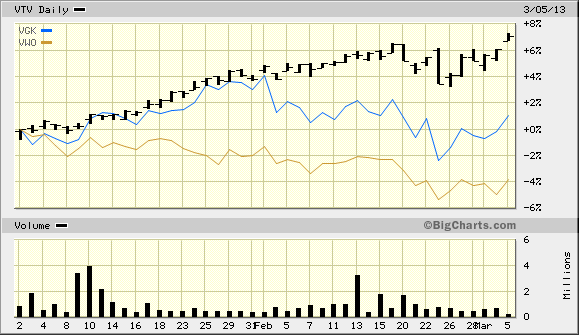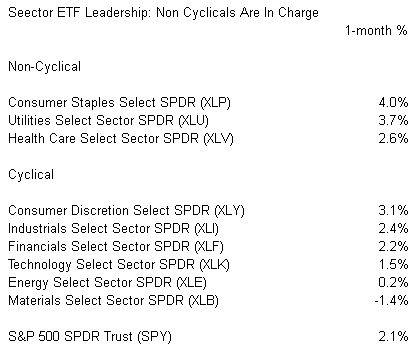Prior to the 2007-2009 financial meltdown in the U.S., risk-takers thoroughly embraced the idea that emerging markets would regularly trounce the developed economies. At times, this simply meant that emerging market stocks would outperform on the upside. At other times, this referred to the ability of “emergers” to hold on to gains… even if U.S. stocks were faltering.
The investing idea that one region’s equity markets could move independently from another’s market had been dubbed, “decoupling.” In fact, the term received so much attention, it has been used to described unanticipated moves between other types of risk assets. For example, high yield bonds are supposed to behave more like stocks. At the start of 2013, however, rate sensitivity had caused the class to dip with investment grade bonds, and “decouple” from the rising stock market.
As the media celebrate record highs for the Dow Jones Industrials, you won’t find much about the decoupling that has occurred in 2013. Vanguard Value (VTV) has jumped roughly 7.5%. In complete contrast, Vanguard Europe (VGK) is flat and Vanguard Emerging Markets (VWO) is down -4%.
Are the declines and near-term downtrends for non-U.S. ETFs hinting at an eventual pullback for U.S. stock ETFs? Should we expect diversified stock indices to eventually “RE-couple.” And if so, is it more likely that non-U.S. funds will catch up with the extraordinary rally in domestic equities?
In my estimation, U.S. stocks haven’t really taken a meaningful breather in 16 weeks. For that matter, we haven’t seen a full-fledged 10% correction since the “fall” of 2011. And perhaps most curious of all, non-cyclical stocks (e.g., consumer staples, pharma, utilities, etc.) are largely outperforming cyclical stocks (e.g., technology, energy, materials, etc.). 
Regardless of the cause(s) — a euro-zone flare up, on-going dysfunction in D.C., employment uncertainty, slowing economic growth — even the best rallies do not go unchecked. I believe it is sensible to have a bit of cash on hand, even if stocks appear immune to a significant sell-off.
Put another way, investors today should think about doing the opposite of their greatest fear. And most investors are petrified of missing the next big leg up in the markets; few investors fear a pulverizing downside slide. If you’re scared that you’ll miss the next big move higher, bank a few profits and raise a modest amount of cash.
Disclosure: Gary Gordon, MS, CFP is the president of Pacific Park Financial, Inc., a Registered Investment Adviser with the SEC. Gary Gordon, Pacific Park Financial, Inc, and/or its clients may hold positions in the ETFs, mutual funds, and/or any investment asset mentioned above. The commentary does not constitute individualized investment advice. The opinions offered herein are not personalized recommendations to buy, sell or hold securities. At times, issuers of exchange-traded products compensate Pacific Park Financial, Inc. or its subsidiaries for advertising at the ETF Expert web site. ETF Expert content is created independently of any advertising relationships.
- English (UK)
- English (India)
- English (Canada)
- English (Australia)
- English (South Africa)
- English (Philippines)
- English (Nigeria)
- Deutsch
- Español (España)
- Español (México)
- Français
- Italiano
- Nederlands
- Português (Portugal)
- Polski
- Português (Brasil)
- Русский
- Türkçe
- العربية
- Ελληνικά
- Svenska
- Suomi
- עברית
- 日本語
- 한국어
- 简体中文
- 繁體中文
- Bahasa Indonesia
- Bahasa Melayu
- ไทย
- Tiếng Việt
- हिंदी
U.S. Stock ETFs 'Decouple' From Foreign Stock ETFs
Published 03/06/2013, 01:04 AM
U.S. Stock ETFs 'Decouple' From Foreign Stock ETFs
Latest comments
Loading next article…
Install Our App
Risk Disclosure: Trading in financial instruments and/or cryptocurrencies involves high risks including the risk of losing some, or all, of your investment amount, and may not be suitable for all investors. Prices of cryptocurrencies are extremely volatile and may be affected by external factors such as financial, regulatory or political events. Trading on margin increases the financial risks.
Before deciding to trade in financial instrument or cryptocurrencies you should be fully informed of the risks and costs associated with trading the financial markets, carefully consider your investment objectives, level of experience, and risk appetite, and seek professional advice where needed.
Fusion Media would like to remind you that the data contained in this website is not necessarily real-time nor accurate. The data and prices on the website are not necessarily provided by any market or exchange, but may be provided by market makers, and so prices may not be accurate and may differ from the actual price at any given market, meaning prices are indicative and not appropriate for trading purposes. Fusion Media and any provider of the data contained in this website will not accept liability for any loss or damage as a result of your trading, or your reliance on the information contained within this website.
It is prohibited to use, store, reproduce, display, modify, transmit or distribute the data contained in this website without the explicit prior written permission of Fusion Media and/or the data provider. All intellectual property rights are reserved by the providers and/or the exchange providing the data contained in this website.
Fusion Media may be compensated by the advertisers that appear on the website, based on your interaction with the advertisements or advertisers.
Before deciding to trade in financial instrument or cryptocurrencies you should be fully informed of the risks and costs associated with trading the financial markets, carefully consider your investment objectives, level of experience, and risk appetite, and seek professional advice where needed.
Fusion Media would like to remind you that the data contained in this website is not necessarily real-time nor accurate. The data and prices on the website are not necessarily provided by any market or exchange, but may be provided by market makers, and so prices may not be accurate and may differ from the actual price at any given market, meaning prices are indicative and not appropriate for trading purposes. Fusion Media and any provider of the data contained in this website will not accept liability for any loss or damage as a result of your trading, or your reliance on the information contained within this website.
It is prohibited to use, store, reproduce, display, modify, transmit or distribute the data contained in this website without the explicit prior written permission of Fusion Media and/or the data provider. All intellectual property rights are reserved by the providers and/or the exchange providing the data contained in this website.
Fusion Media may be compensated by the advertisers that appear on the website, based on your interaction with the advertisements or advertisers.
© 2007-2025 - Fusion Media Limited. All Rights Reserved.
